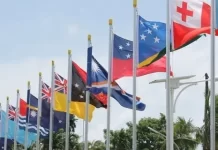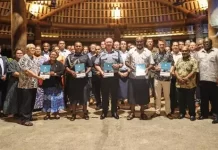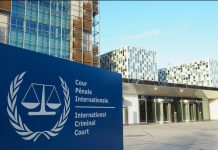As the gavel comes down at COP27, countries on the frontlines of the climate crisis including Pacific Island nations have compelled world leaders to take a step forward on climate justice by establishing a loss and damage finance facility, Greenpeace Australia Pacific says.
The COP27 final decision text does not see any improved commitments to phase out all fossil fuels or sufficient measures to reach the 1.5 degree target, but it does contain a breakthrough agreement to establish a loss and damage finance facility.
Shiva Gounden, Pacific advisor at Greenpeace Australia Pacific, said developing countries such as low-lying Pacific Island nations have compelled the world to take a step forward on the urgent and critical issue of loss and damage.
“The establishment of a loss and damage finance facility at COP27 marks a new dawn for climate justice. This breakthrough is a testament to the unwavering bravery and resilience of the most vulnerable against all odds, with rich developed countries choking progress throughout negotiations, having failed to do their homework since Glasgow.
“Pacific Island nations are on the frontlines of the climate crisis and at the forefront of the fight for climate justice. We’ve worked for a generation for this moment. More than thirty years after the idea of loss and damage was first introduced by Vanuatu, it is Pacific Island nations and the developing world that has made COP27 a real moment for action on climate justice.
“Moving forward into discussion of the details of the fund, we need to ensure that those most responsible for the climate crisis make the biggest contribution. For countries like Australia that spent a staggering $11.6 billion (US$7.3 billion) on fossil fuel subsidies in 2021-2022, this means paying up, not paying off polluting industries.
“The Australian government must take stock of this moment and truly champion our journey for climate justice through words and action, and through addressing the causes and symptoms of the climate crisis.”
Ulaiasi Tuikoro, Fijian climate activist and representative of the Pacific Youth Council, said the deal offered the Pacific Islands a glimmer of hope, but the fight for climate justice is long from over.
“It was devastating for us Pacific Islanders to go into rooms and negotiate. We don’t negotiate numbers and clauses, we negotiate our lives, cultures, communities, people, and our very existence.
“The commitment to a loss and damage finance facility at COP27 is a result of solidarity and a step forward for climate justice, but in order to give the Pacific a fighting chance we must tackle the causes and the consequences of the climate crisis simultaneously. The world must move on agreeing to phase out all fossil fuels and throw every effort behind preserving our 1.5 degree lifeline.”
Taren Chilia, 20-year climate activist from Vanuatu, urged world leaders to learn from the breakthrough on loss and damage at COP27 and honour their commitments.
“I am proud to be from Vanuatu, where the idea of loss and damage first came from a whole decade before I was born. This is an idea that was born in the Pacific and driven forward at COP27 by Pacific Islanders fighting for their lives, livelihoods, and ways of living.
“I laid the first brick of my school together with my father after Cyclone Pam devastated my village in Vanuatu. These coming years will determine if our Pacific homes and cultures will continue or if our most vulnerable will see their homes sink under the seas. Pacific peoples taught the world a lesson at COP27 – we may be drowning, but we are fighting. And we will continue to fight until climate justice is truly served,” said Chilia.
SOURCE: GREENPEACE/PACNEWS















